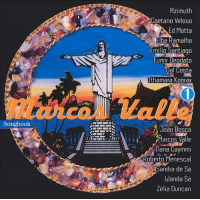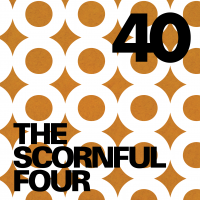Home » Jazz Musicians » Caetano Veloso
Caetano Veloso
Caetano Emanuel Viana Teles Veloso, known as Caetano Veloso, is a Grammy Award-winning Brazilian composer and singer, called "One of the greatest songwriters of the century", whose voice "carries an abiding tenderness" and is sometimes considered the Bob Dylan of Brazil. Veloso was born in Santo Amaro da Purificação, Bahia, the fifth of the seven children born to José Teles Veloso ("Seu Zeca") (1901-1983) and Claudionor Viana Teles Veloso ("Dona Canô'") (1907-). He chose the name for his baby sister (Veloso's parents's sixth child), named after a famous song of the time (18 June 1946) by Nelson Gonçalves. Maria Bethânia, his sister, preceded him to fame as a singer in the mid-1960s. He began his career singing Latin pop with a bossa nova edge, and he has cited his greatest musical influences from his early period as João Gilberto and Dorival Caymmi. (João Gilberto would say later about Caetano's contribution that it added an intellectual dimension to Brazilian popular music.) With such musical collaborators Gilberto Gil, Gal Costa, Tom Zé, and Os Mutantes, and a strong influence of the later work of The Beatles, Veloso developed Tropicalismo, which fused Brazilian pop with rock and roll and avant garde music resulting in a more international, psychedelic, and socially aware sound. Veloso's politically active stance, unapologetically leftist, earned him the enmity of Brazil's military dictatorship which ruled until 1985; his songs were frequently censored, and some were banned. Veloso was also alienated from the socialist left in Brazil because of his acceptance and integration of non-nationalist influences (like rock and roll) in his music. Veloso and Gilberto Gil spent several months in jail for "anti-government activity" in 1968 and eventually exiled themselves to London. Along with many other artists Caetano was living each verse of Geraldo Vandré's political hymn: Yet they make of a flower their strongest refrain, And believe flowers to defeat guns. Caetano Veloso's work upon his return in 1972 was often characterized by frequent merger not only of international styles, but of half-forgotten Brazilian folkloric styles and rhythms as well. In particular, his celebration of the Afro-Brazilian culture of Bahia can be seen as the precursor of such Afro-centric groups as Timbalada. In the 1980s, Veloso's popularity outside Brazil grew, especially in Israel, Greece, Portugal, France and Africa. In the United States, his records, such as O estrangeiro, produced by Arto Lindsay helped gain him a larger audience. By 2004, he was one of the most respected and prolific international pop stars, with more than fifty recordings available, including songs in soundtracks of movies such as Michelangelo Antonioni's Eros, Pedro Almodóvar's Hable con Ella (Talk to Her), and Frida, for which he performed at the 75th Academy Awards but did not win.
Read moreTags
Caetano Veloso, James Carter, Hamza Akram, Eyal Vilner and David Grollman

by Martin Longley
Caetano Veloso Brooklyn Academy Of Music April 12, 2019 Always essential for the local Brazilian community, but also far beyond, into the general music enthusiast zone, singer and songwriter Caetano Veloso made one of his occasional visits to NYC, presenting the Ofertório show. Essentially, this involved his three musical sons, in an intimate almost-acoustic setting (just very subtle Fender Rhodes and a low-presence electric bass), simply savouring father's fine songs, from the last five ...
Continue ReadingCaetano Veloso: zii e zie

by Ernest Barteldes
Legendary Brazilian singer-songwriter Caetano Veloso follows up on the career-shifting Cê (Nonesuch, 2008) with zii e zie, featuring the same band. Though the lineup includes only guitar, bass and drums (plus some occasional acoustic guitar from Veloso), the arrangements all carry his signature complexities and bossa-inspired changes.
In contrast to Cê, there are few angry moments. Instead, Veloso now wonders about his own ability to fall in love again and about the beauty around him. He often uses ...
Continue ReadingCaetano Veloso in Ann Arbor, Michigan

by C. Andrew Hovan
Caetano Veloso University of Michigan's Hill Auditorium Ann Arbor, Michigan November 9, 2007
Although the University Musical Society based at the University of Michigan has always had somewhat broad tastes in music, making each season a delightful potpourri of genre mixing, recently they have delved heartily into Brazilian music, presenting some of that country's best artists. Past presentations have included concerts by Gilberto Gil and Egberto Gismonti. A recent bill at Hill Auditorium ...
Continue ReadingCaetano Veloso: Ce

by Matt Cibula
Cê is not a jazz album, but it's not really a pop or samba or world music record, and despite its vocals/guitar/bass/drums format, it's not a rock album either. So why am I reviewing it here? Well, first because it's by Caetano Veloso, the reigning genius of Brazilian popular music, and therefore worthy of study. On the realz, the man is responsible for more haunting beauty, discordant craziness, avant-garde poetry, and overall visionary-itude than anyone else living anywhere in the ...
Continue ReadingNonesuch Releases Caetano Veloso and David Byrne "Live at Carnegie Hall" on March 13; Pre-Order Now

Source:
Michael Ricci
In the spring of 2004, Caetano Veloso curated a week of special concerts at New York's Carnegie Hall as one of its prestigious Perspectives artists. As part of the series, he invited his longtime friend and collaborator David Byrne to join him for an evening in Isaac Stern Auditorium. The concert was recorded for broadcast on NPR and now will be released by Nonesuch as Caetano Veloso and David Byrne: Live at Carnegie Hall on March 13, 2012. The singer/guitarists ...
read more
Caetano Veloso in Boston on April 12

Source:
Sue Auclair Promotions
An Evening With Brazilian Superstar Caetano Veloso Monday, April 12 at The Orpheum Theatre
Veloso's New CD: Zii e Zie
“The Brazilian master remains in a league of his own. Forty years after injecting a rock beat into Brazilian pop (and earning the disapproval of the country's military rulers in the process), Veloso has returned to similar territory . . . fans won't be disappointed." --Times (UK)
HT Productions will present An Evening With Caetano Veloso Monday, April 12 at ...
read more
Caetano Veloso Will Open the Greek Theatres 2010 Season

Source:
Michael Ricci
Caetano Veloso is one of the greatest songwriters of the century: a master melodist, a lyricist who merges surreal imagery with a sense of history and a sense of humor, a singer whose voice radiates tenderness and supple swing and a musician who connects to traditional music, pop and jazz from all over. The New York Times Caetano Veloso will open the award-winning Greek Theatres 2010 season on Thursday, April 15. Caetano Veloso is among the most influential and beloved ...
read more
Caetano Veloso in Concert Friday, November 2 - Orpheum Theatre Boston

Source:
Sue Auclair Promotions
HT Productions Presents Caetano Veloso In Concert Friday, November 2 at The Orpheum Theatre Veloso's New CD: ce HT Productions will present Caetano Veloso Friday, November 2 at 8:00 p.m. at the Orpheum Theatre [1 Hamilton Place, Boston, MA 02108]. Tickets at $49.00 (Golden Circle), $43.00, and $31.00 (prices include $1.00 Orpheum restoration fee) will be on sale as of Monday, September 10 at the Orpheum Box Office [10:00 a.m. ...
read more























.jpg)











